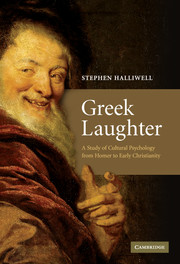Book contents
- Frontmatter
- Contents
- Preface
- Note to the reader
- Abbreviations
- 1 Introduction: Greek laughter in theory and practice
- 2 Inside and outside morality: the laughter of Homeric gods and men
- 3 Sympotic elation and resistance to death
- 4 Ritual laughter and the renewal of life
- 5 Aischrology, shame and Old Comedy
- 6 Greek philosophy and the ethics of ridicule
- 7 Greek laughter and the problem of the absurd
- 8 The intermittencies of laughter in Menander's social world
- 9 Lucian and the laughter of life and death
- 10 Laughter denied, laughter deferred: the antigelastic tendencies of early Christianity
- Appendix 1 The Greek (body) language of laughter and smiles
- Appendix 2 Gelastic faces in visual art
- Bibliography
- Index of selected authors and works
- Index of selected Greek terms
- General index
7 - Greek laughter and the problem of the absurd
Published online by Cambridge University Press: 22 September 2009
- Frontmatter
- Contents
- Preface
- Note to the reader
- Abbreviations
- 1 Introduction: Greek laughter in theory and practice
- 2 Inside and outside morality: the laughter of Homeric gods and men
- 3 Sympotic elation and resistance to death
- 4 Ritual laughter and the renewal of life
- 5 Aischrology, shame and Old Comedy
- 6 Greek philosophy and the ethics of ridicule
- 7 Greek laughter and the problem of the absurd
- 8 The intermittencies of laughter in Menander's social world
- 9 Lucian and the laughter of life and death
- 10 Laughter denied, laughter deferred: the antigelastic tendencies of early Christianity
- Appendix 1 The Greek (body) language of laughter and smiles
- Appendix 2 Gelastic faces in visual art
- Bibliography
- Index of selected authors and works
- Index of selected Greek terms
- General index
Summary
ἔστι δὴ τοίνυν τὰ τῶν ἀνθρώπων πϱάγματα μεγάλης μὲν σπουδῆς οὐκ ἄξια, ἀναγκαῖόν γε μὴν σπουδάζειν.
(Human affairs are really not worth much seriousness, yet all the same we can't escape taking them seriously.)
Plato LawsNostre propre et peculiere condition est autant ridicule que risible.
MontaigneWipe your hand across your mouth, and laugh;
The worlds revolve like ancient women
Gathering fuel in vacant lots.
T. S. EliotEXISTENTIAL ABSURDITY: PREDICAMENTS ANCIENT AND MODERN
The eponymous protagonist of Samuel Beckett's early novel Murphy spends most of his time in search of an escape from the burden of mundane consciousness, or from what the novel calls his ‘unredeemed split self’. Murphy survives by cultivating a sort of impassivity: in Beckett's words, a ‘self-immersed indifference to the contingencies of the contingent world which he had chosen for himself as the only felicity’. Such impassivity is a version of Greek ataraxia, and the novel itself invites us to think of Murphy's mental life as a whole in the terms of Greek philosophy. We learn, for one thing, how Murphy had studied with the eccentrically Pythagorean Neary, whose attempt to inculcate an ‘attunement’ and blending of ‘the opposites in Murphy's heart’ had proved fruitless. An entire chapter, moreover, is devoted to the depiction of Murphy's mind as both markedly tripartite and as a kind of private Platonic Cave, divided into zones of light, half light and darkness.
- Type
- Chapter
- Information
- Greek LaughterA Study of Cultural Psychology from Homer to Early Christianity, pp. 332 - 387Publisher: Cambridge University PressPrint publication year: 2008



